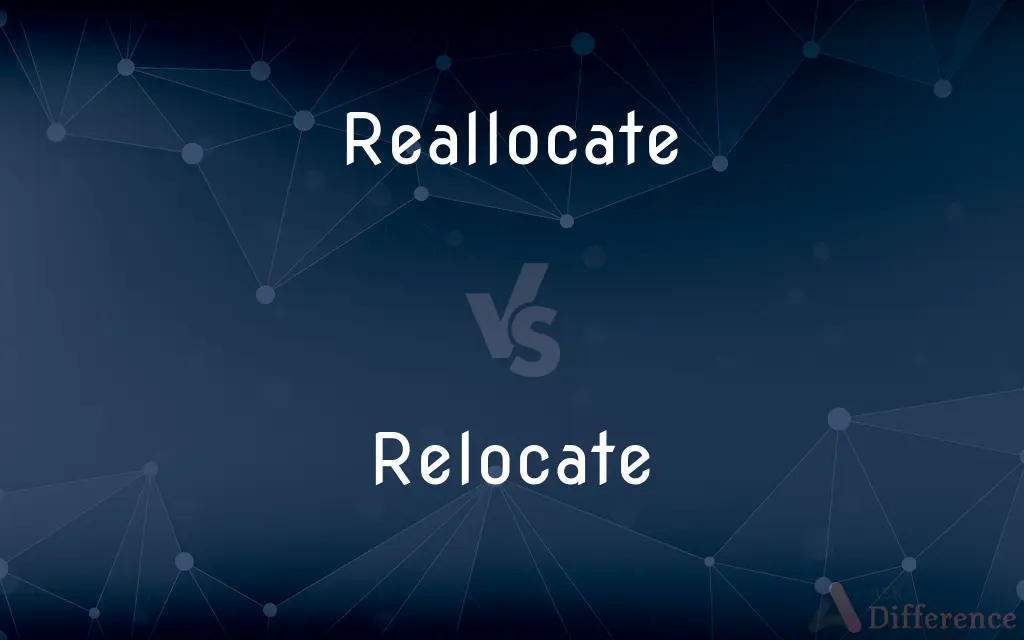Reallocate vs. Relocate — What's the Difference?
By Tayyaba Rehman & Maham Liaqat — Updated on April 4, 2024
Reallocate involves changing the distribution or use of resources, whereas relocate means to move to a new place.

Difference Between Reallocate and Relocate
Table of Contents
ADVERTISEMENT
Key Differences
Reallocating refers to the process of distributing resources, responsibilities, or tasks differently than they were previously arranged. This can involve shifting budgetary funds, manpower, or other assets from one project, department, or area to another to better meet objectives or respond to changing needs. On the other hand, relocating involves moving people, businesses, or assets from one physical location to another. This can be driven by personal choices, economic reasons, or strategic considerations, and it impacts physical presence rather than how resources are distributed.
While reallocating is primarily concerned with the optimization or efficient use of resources within an organization or system, relocating emphasizes the physical or geographical aspect of changing one’s position or base. Reallocating does not necessarily imply a physical movement but rather a strategic internal adjustment. Conversely, relocating inherently involves a change in location, which can be a significant logistical operation.
The decision to reallocate resources is often motivated by the desire to improve performance, respond to internal or external shifts, or optimize outcomes based on current priorities. Relocating, however, might be motivated by the need for a more favorable location, expansion opportunities, cost reduction, or other strategic benefits related to physical placement.
Both reallocating and relocating can have profound impacts on the entities involved, but the nature of these impacts differs. Reallocating may affect how effectively a team, department, or organization meets its goals, influencing efficiency, morale, and productivity. Relocating affects logistical considerations, adaptation to new environments, and potentially the broader strategic positioning of an individual or organization.
In practice, reallocating might involve a company shifting its budget from one project to another to capitalize on emerging opportunities or address unforeseen challenges. Relocating, in contrast, could involve a business moving its headquarters to a different city or country to take advantage of lower operational costs or access to new markets.
ADVERTISEMENT
Comparison Chart
Definition
Changing the distribution or use of resources.
Moving to a new place.
Focus
Optimization or adjustment of resources.
Change in physical or geographical location.
Purpose
To better meet objectives or respond to changes.
Driven by personal, economic, or strategic considerations.
Impact
Affects efficiency, productivity, and goal attainment.
Involves logistical changes and adaptation to new environments.
Example
Shifting budget from marketing to research and development.
A family moving to a new city for a job opportunity.
Compare with Definitions
Reallocate
Adjusting resources within a project.
The team decided to reallocate funds from advertising to product development.
Relocate
Personal decision for change.
She decided to relocate for a new job opportunity across the country.
Reallocate
Shifting priorities or tasks.
Management chose to reallocate responsibilities to focus on the most urgent needs.
Relocate
Strategic business decision.
To reduce costs, the manufacturing plant will relocate to a region with lower expenses.
Reallocate
Responding to changing needs.
In response to market demand, the company reallocated resources to its digital platforms.
Relocate
Business changing locations.
The startup will relocate its office to a tech hub to foster innovation.
Reallocate
Efficiency-driven changes.
To increase efficiency, the department reallocated staff to different projects.
Relocate
Moving to a new residence.
They plan to relocate to the countryside for a quieter life.
Reallocate
Optimizing use of assets.
The NGO reallocated donations to support emergency relief efforts.
Relocate
Adapting to new environments.
After relocating, the company adapted quickly to the cultural and business practices of the new country.
Reallocate
(transitive) To allocate (a resource) to another person or purpose.
I want to reallocate some of my money from stocks to bonds. (I want to sell some of my stocks and use the proceeds to buy bonds to replace them.)
Relocate
To move to or establish in a new place
Relocated the business.
Reallocate
(transitive) To allocate again.
Appending items one at a time is still a better deal than concatenation, which reallocates every time.
Relocate
To become established in a new residence or place of business
Relocated in Ohio.
Reallocate
Allocate, distribute, or apportion anew;
Congressional seats are reapportioned on the basis of census data
Relocate
(transitive) to move (something) from one place to another.
We had to relocate the magazine rack because we bruised our shins on it too frequently when it was near the door.
Relocate
(intransitive) to change one's domicile or place of business.
Alfred relocated to Colorado Springs to take advantage of the boom in the defense industry.
Relocate
To locate again.
Relocate
Become established in a new location;
Our company relocated to the Midwest
Relocate
Move or establish in a new location;
We had to relocate the office because the rent was too high
Common Curiosities
What are the challenges of relocating?
Challenges include managing the logistics of the move, adjusting to a new environment, and the costs associated with relocation.
How do reallocating and relocating differ in terms of impact?
Reallocating primarily affects internal efficiency and productivity, while relocating involves logistical adjustments and adapting to new environments.
Why might a person or business decide to relocate?
A move might be driven by personal desires, like a lifestyle change, or strategic business reasons, such as cost reduction or market expansion.
Can reallocating resources impact a company’s success?
Yes, effectively reallocating resources can significantly impact a company's ability to meet goals, adapt to changes, and optimize outcomes.
What does it mean to reallocate resources?
To reallocate resources means changing their distribution or usage to better align with current needs or objectives.
Is reallocating always a response to negative developments?
No, reallocating can also be a proactive strategy to seize new opportunities or enhance performance.
What factors might influence a decision to relocate?
Influences include economic factors, growth opportunities, lifestyle considerations, and strategic positioning.
Can a company reallocate and relocate at the same time?
Yes, a company might reallocate resources as part of a strategic plan that also includes relocating operations or offices.
How do individuals decide what resources to reallocate?
Decisions are based on assessments of current performance, future objectives, and the potential impact of changes.
What should be considered before deciding to relocate?
Considerations include cost, potential benefits, the impact on employees or family, and the readiness to adapt to a new setting.
Share Your Discovery

Previous Comparison
Pant vs. Trouser
Next Comparison
Catalog vs. CataloguingAuthor Spotlight
Written by
Tayyaba RehmanTayyaba Rehman is a distinguished writer, currently serving as a primary contributor to askdifference.com. As a researcher in semantics and etymology, Tayyaba's passion for the complexity of languages and their distinctions has found a perfect home on the platform. Tayyaba delves into the intricacies of language, distinguishing between commonly confused words and phrases, thereby providing clarity for readers worldwide.
Co-written by
Maham Liaqat













































